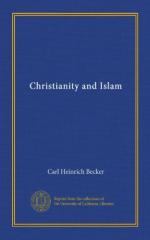Recognition of this fact can only be obtained at the price of a breach with ecclesiastical mode of thought. Premonitions of some such breach are apparent in modern Muhammedanism: for ourselves, they are accomplished facts. If I correctly interpret the signs of the times, a retrograde movement in religious development has now begun. The religion inspiring a single personality, has secured domination over the whole of life: family, society, and state have bowed beneath its power. Then the reaction begins: slowly religion loses its comprehensive force and as its history is learned, even at the price of sorrow, it slowly recedes within the true limits of its operation, the individual, the personality, in which it is naturally rooted.
CONCLUSION AND BIBLIOGRAPHY
The purpose of the present work has been to show not so much the identity of Christian and Muhammedan theories of life during the middle ages, as the parallel course of development common to both, and to demonstrate the fact that ideas could be transferred from one system to the other. Detail has been sacrificed to this general purpose. The brief outline of Muhammedan dogmatics and mysticism was necessary to complete the general survey of the question. Any one of these subjects, and the same is true as regards a detailed life of Muhammed, would require at least another volume of equal size for satisfactory treatment.
The Oriental scholar will easily see where I base my statements upon my own researches and where I have followed Goldziher and Snouck. My chief source of information, apart from the six great books of tradition, has been the invaluable compilation of Soj[=u]t[=i], the great Kanz el-’Umm[=a]l (Hyderabad, 1314). To those who do not read Arabic may be recommended the French translation of the Boch[=a]r[=i], of which two volumes are now published: El-Bokahri, les traditions islamiques traduites ... par O. Houdas and W. Marcais. Paris, 1906.
Of general works dealing with the questions I have touched, the following, to which I owe a considerable debt, may be recommended:—
J. Goldziher. Muhammedanische Studien,
Halle, 1889 and following
year.
Die Religion des Islams (Kult. d. Gegenw., I, iii. 1).




